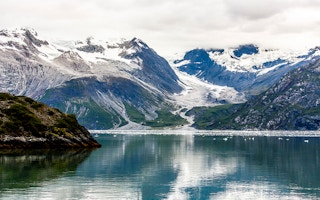Using records of glacier length that go back over 400 years, researchers show that shrinking of mountain glaciers in five continents could almost certainly not have happened if the Earth wasn’t warming up.
The findings suggest that future reports from the Intergovernmental Panel on Climate Change (IPCC) should have stronger conclusions around how human-caused climate change is affecting the world’s glaciers, the researchers say.
Attribution
The study, just published in Nature Geoscience, is the latest in the relatively new field of attribution, where scientists identify the fingerprints of human influence on observed changes in temperature, rainfall, and other climate parameters.
Attribution studies typically focus on specific extreme events. Recent research has found, for example, that climate change boosted the odds of the UK’s very wet winter in 2013-14 by 43 per cent. Another paper identified how many extra deaths there were in London and Paris during the 2003 summer heatwave because of our warming climate.
Rather than an event of a few hours, weeks or months, the new study looks at how glaciers have changed over the past century.
The near-global retreat of these rivers of ice “seems improbable” without the influence of climate change, the paper says, but most studies to date have only been able to test this theory on a few glaciers at most.
“
Our paper demonstrates that the worldwide retreat of glaciers necessarily requires a climate change that is centennial in duration and global in extent.
Gerard Roe, Earth and Space Sciences, University of Washington
So the researchers collected together records of glacier length for 37 glaciers in North America, South America, Europe, Asia and Australasia. The records were selected for their length and completeness – the longest goes back to 1534.
Whether a glacier retreats or advances each year largely depends on its mass balance – the difference between how much snow it receives and the amount of its ice that melts away. Glaciers that lose more mass through melting than they gain from snow will shrink and retreat back up the valley.
Using the long-term records, the researchers estimated how glacier lengths have varied in response to the yearly ups and downs of temperature and snowfall. They then compared these natural fluctuations with the large-scale retreat seen in the glaciers in the 20th and 21st centuries.
Their findings show there’s only a very small chance that the retreat of these glaciers could have happened without climate change, says lead author Prof Gerard Roe from the Earth and Space Sciences department at the University of Washington.
He tells Carbon Brief: “Our paper demonstrates that the worldwide retreat of glaciers necessarily requires a climate change that is centennial in duration and global in extent.”
The findings constitute “categorical evidence” that the climate is warming, the paper says.
‘Virtually certain’
The results suggest for all but one of the 37 glaciers, there’s a more than 90 per cent probability that their retreat is a result of a change in climate. In the vernacular of the IPCC, this level of likelihood means it is “very likely” that the changes are attributable to human-caused climate change.
For 21 of the 37, the findings are even more emphatic. They find that it is over 99 per cent likely – or “virtually certain” – that glacier retreat is being driven by climate change.
These likelihoods are stronger than the findings on glaciers in the most recent IPCC assessment report (“AR5”), published in 2013, the paper notes.
This story was published with permission from Carbon Brief. Read the full story.










